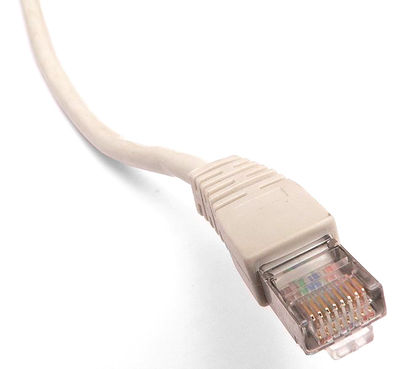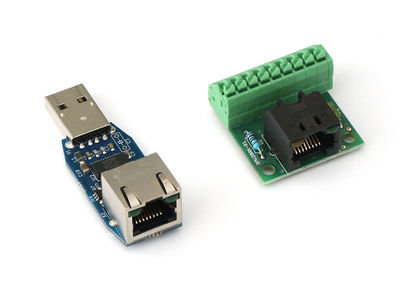Difference between revisions of "SimpleMotion V2 port"
| [checked revision] | [checked revision] |
(added rs485 tech spces) (Tag: VisualEditor) |
|||
| (30 intermediate revisions by the same user not shown) | |||
| Line 1: | Line 1: | ||
| + | [[File:multidrop_estop.png|thumb|500px|SM V2 multidrop bus with E-stop functionality]] | ||
[[File:Ethernet_RJ45_connector_p1160054.jpg|thumb|RJ45 cable compatible with Ethernet and SimpleMotion V2]] | [[File:Ethernet_RJ45_connector_p1160054.jpg|thumb|RJ45 cable compatible with Ethernet and SimpleMotion V2]] | ||
[[SimpleMotion V2]] communication link and [[Argon (servo drive)|Argon]] drives use [http://en.wikipedia.org/wiki/Modular_connector#8P8C RJ45] connectors and cables as physical connection standard. | [[SimpleMotion V2]] communication link and [[Argon (servo drive)|Argon]] drives use [http://en.wikipedia.org/wiki/Modular_connector#8P8C RJ45] connectors and cables as physical connection standard. | ||
RJ45 is well known from Ethernet connectors and same cables may be used with SimpleMotion wiring. | RJ45 is well known from Ethernet connectors and same cables may be used with SimpleMotion wiring. | ||
| − | == | + | ==Bus properties== |
SimpleMotion V2 uses [[Wikipedia:RS485|RS485]] electrical serial communication standard for all data transfer. Some main benefits of using RS485 are: | SimpleMotion V2 uses [[Wikipedia:RS485|RS485]] electrical serial communication standard for all data transfer. Some main benefits of using RS485 are: | ||
| − | |||
| − | |||
* Multidrop buses possible (up to 32 devices in single serial link) | * Multidrop buses possible (up to 32 devices in single serial link) | ||
* High reliability due to differential signaling | * High reliability due to differential signaling | ||
* High data rates and long cable lengths possible | * High data rates and long cable lengths possible | ||
* Easy to interface even from smallest microcontrollers with [[Wikipedia:Universal_asynchronous_receiver/transmitter|UART]] | * Easy to interface even from smallest microcontrollers with [[Wikipedia:Universal_asynchronous_receiver/transmitter|UART]] | ||
| − | As default SimpleMotion V2 uses 460800 BPS bitrate. | + | * Low wire count, only 2 signal wires + ground needed |
| − | == | + | * Bidirectional data transfer (receive & transmit) in one wire pair |
| − | [[ | + | * Cabling with standard RJ45 Ethernet cables |
| − | == | + | As default SimpleMotion V2 uses 460800 BPS bitrate and can deliver over 1000 motion commands per second. With 4 MBPs speed the bus can deliver up to 20 000 motion commands per second by using the "fast update cycle" SimpleMotion function. |
| − | [[File: | + | {{damage|Don't use [http://en.wikipedia.org/wiki/Ethernet_crossover_cable crossover] RJ45 cables in SimpleMotion V2 system}} |
| − | + | ||
| − | + | ==PC connection== | |
| − | + | SimpleMotion V2 devices can be controlled and configured from PC computer by the help of compatible RS485 adapter. The most common way is to use USB to SimpleMotion V2 adapters such as: | |
| − | + | *[[SimpleMotion V2 USB adapter]] | |
| − | + | *[[DIY SimpleMotion V2 adapter]] | |
| − | + | *Compatible third party adapters | |
| − | + | **PCI-e / PCI RS485 adapters with at least 460.2k bps speed support | |
| − | + | **Ethernet RS485 adapters with at least 460.2k bps speed support. | |
| − | + | ***Moxa NPort 5xxx devices have been verified to work reliably with SimpleMotion through their virtual COM port over Ethernet driver. | |
| − | + | **FTDI USB chip based RS485 devices | |
| − | + | ||
| − | + | === RS485 settings === | |
| − | + | SimpleMotion uses the most common configuration of RS485 bus: | |
| − | + | * Serial port settings | |
| − | + | ** 460800 bps | |
| − | + | ** 1 start bit | |
| − | + | ** 1 stop bit | |
| − | + | ** no parity bit | |
| − | + | ** no flow control | |
| − | + | * Bus physical construction | |
| − | [[ | + | ** 100-130 ohm termination resistors at both ends of the RS485 line |
| + | ** Biasing resistors at the one or two ends of the RS485 line (600-800 ohm pull-down to GND on B line and 600-800 ohm pull-up to 5V on A line) | ||
| + | ** For more info, see https://en.wikipedia.org/wiki/RS-485 | ||
| + | |||
| + | ==Using SMV2 port as E-stop & Enable input== | ||
| + | In SMV2 compatible drives, the SMV2 connector acts also as emergency stop or [[Safe torque off]] input. User may connect a e-stop button directly at the end of device chain to gain reliable stopping mechanism for all linked devices. | ||
| + | ===Wiring with [[SMV2BRK]]=== | ||
| + | [[File:Smv2kit m.jpg|thumb|[[SimpleMotion V2 USB adapter|SMV2USB]] adapter and [[SMV2BRK]] bus termination board]] | ||
| + | The preferred method to wire STO and Enable signals to SM bus is to add a [[SMV2BRK]] break out board at the end of bus chain. SMV2BRK acts as RS485 termination resistor and a wire terminal for STO and Enable signals with easy interfacing to switches. | ||
| + | |||
| + | For commissioning of SMV2BRK, see it's dedicated [[SMV2BRK|SMV2BRK page]]. | ||
| + | ===Wiring with [[IONICUBE]] devices=== | ||
| + | IONICUBE motherboards have on broad routing from RJ45 connector to user accessible wire terminals. When using these motherboards, see [[IONI & IONICUBE user guide]] for wiring. | ||
| + | |||
| + | ===Wiring with bare RJ45 cable=== | ||
| + | To terminate SMV2 bus and connect switches without SMV2BRK, see [[SimpleMotion V2 termination with bare cable]]. | ||
| + | |||
[[Category:Hardware]] | [[Category:Hardware]] | ||
| + | [[Category:Argon_wiring]] | ||
[[Category:SimpleMotion]] | [[Category:SimpleMotion]] | ||
| − | |||
Latest revision as of 11:22, 7 March 2018
SimpleMotion V2 communication link and Argon drives use RJ45 connectors and cables as physical connection standard.
RJ45 is well known from Ethernet connectors and same cables may be used with SimpleMotion wiring.
Contents
Bus properties[edit | edit source]
SimpleMotion V2 uses RS485 electrical serial communication standard for all data transfer. Some main benefits of using RS485 are:
- Multidrop buses possible (up to 32 devices in single serial link)
- High reliability due to differential signaling
- High data rates and long cable lengths possible
- Easy to interface even from smallest microcontrollers with UART
- Low wire count, only 2 signal wires + ground needed
- Bidirectional data transfer (receive & transmit) in one wire pair
- Cabling with standard RJ45 Ethernet cables
As default SimpleMotion V2 uses 460800 BPS bitrate and can deliver over 1000 motion commands per second. With 4 MBPs speed the bus can deliver up to 20 000 motion commands per second by using the "fast update cycle" SimpleMotion function.
| Don't use crossover RJ45 cables in SimpleMotion V2 system |
PC connection[edit | edit source]
SimpleMotion V2 devices can be controlled and configured from PC computer by the help of compatible RS485 adapter. The most common way is to use USB to SimpleMotion V2 adapters such as:
- SimpleMotion V2 USB adapter
- DIY SimpleMotion V2 adapter
- Compatible third party adapters
- PCI-e / PCI RS485 adapters with at least 460.2k bps speed support
- Ethernet RS485 adapters with at least 460.2k bps speed support.
- Moxa NPort 5xxx devices have been verified to work reliably with SimpleMotion through their virtual COM port over Ethernet driver.
- FTDI USB chip based RS485 devices
RS485 settings[edit | edit source]
SimpleMotion uses the most common configuration of RS485 bus:
- Serial port settings
- 460800 bps
- 1 start bit
- 1 stop bit
- no parity bit
- no flow control
- Bus physical construction
- 100-130 ohm termination resistors at both ends of the RS485 line
- Biasing resistors at the one or two ends of the RS485 line (600-800 ohm pull-down to GND on B line and 600-800 ohm pull-up to 5V on A line)
- For more info, see https://en.wikipedia.org/wiki/RS-485
Using SMV2 port as E-stop & Enable input[edit | edit source]
In SMV2 compatible drives, the SMV2 connector acts also as emergency stop or Safe torque off input. User may connect a e-stop button directly at the end of device chain to gain reliable stopping mechanism for all linked devices.
Wiring with SMV2BRK[edit | edit source]
The preferred method to wire STO and Enable signals to SM bus is to add a SMV2BRK break out board at the end of bus chain. SMV2BRK acts as RS485 termination resistor and a wire terminal for STO and Enable signals with easy interfacing to switches.
For commissioning of SMV2BRK, see it's dedicated SMV2BRK page.
Wiring with IONICUBE devices[edit | edit source]
IONICUBE motherboards have on broad routing from RJ45 connector to user accessible wire terminals. When using these motherboards, see IONI & IONICUBE user guide for wiring.
Wiring with bare RJ45 cable[edit | edit source]
To terminate SMV2 bus and connect switches without SMV2BRK, see SimpleMotion V2 termination with bare cable.


